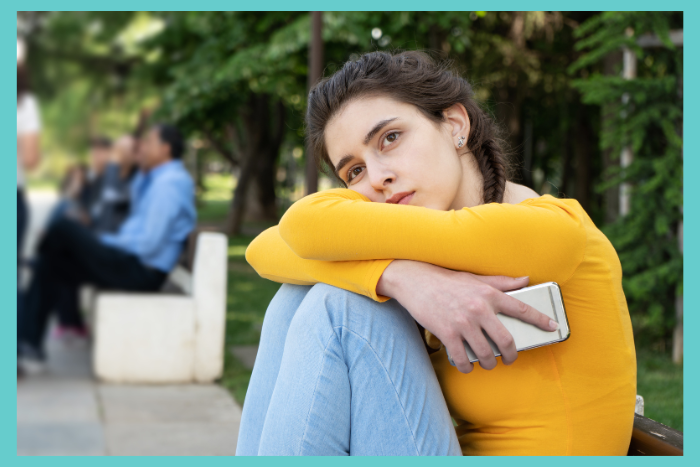The teen years are a critical time in a young person’s life. As we go through our teenage years, we begin to form ideas about ourselves and the world we live in. It’s a period of big changes and the time when most people start feeling a lot of social pressure. Teens today are growing up with unprecedented challenges. They’re exposed to all kinds of negative messages on social media, pressures to fit in. Many teens worry about the future and are concerned with social issues like climate change, gun violence and racial injustice.
Teen depression goes beyond sadness and sour moods. Symptoms like low energy and insomnia can affect their ability to function. Extreme negative thoughts and feelings can turn into loneliness, self-isolation and a pessimistic outlook.
If your teen is struggling with major depressive disorder (MDD), they’re definitely not alone: 15% of children between the ages of 12 and 17 reported experiencing at least one major depressive episode in the past year, according to Mental Health America.
With the help of a trusted therapist, group therapy, or a clinical care team, your teen can get through this tough time and make a plan for maintaining their mental health. This article describes the elements of effective depression treatment for teens and the higher levels of treatment available to them.
What depression treatments are helpful for teens?
Many mental health resources will tell you that a combination of cognitive behavioral therapy (CBT) and medication is the gold standard treatment for teen depression. For mild cases, this is usually enough. However, teens experiencing moderate and severe major depressive disorder need more comprehensive and personalized treatment. Their individual care plan should include family therapy sessions and peer support groups as well as individual therapy.
Many people don’t know there are levels of mental healthcare between outpatient therapy and inpatient care. Structured outpatient programs provide several hours of care during the day instead of 24-hour treatment in a hospital. Partial hospitalization programs (PHPs) are the highest level of structured outpatient care. They’re best for teens who are struggling with school and other daily activities. Intensive outpatient programs (IOPs) are better for teens who need more intensive care than outpatient therapy alone but can handle a few days of school per week. These programs usually include family therapy sessions, group therapies and peer support groups.
7 treatments that help teens experiencing major depressive disorder
Many factors will affect the treatment recommendations your teen receives for major depressive disorder. A clinical team will provide recommendations after a professional assessment. You’ll be a part of the decision-making process as part of your child’s care team. Your child’s ability to function and the amount of support they need with schoolwork are among the most important things to consider. Your child’s health insurance or your ability to pay for treatment will also be a big determining factor.
The following types of treatment are helpful for teens with major depressive disorder:
- Psychotherapy — CBT is the foundation on which many helpful interventions are built. It encourages people to become more aware of their own thoughts and feelings. With the help of a therapist, they start to uncover how these things affect each other and find ways to reframe unhelpful beliefs.
- Medication management —With moderate or severe major depressive disorder, it’s best to see a specialist who’s well versed in psychiatric medication. A psychiatrist or psychiatric nurse practitioner can help find medications that work for your child and guide them through periods of adjustment.
- Peer support groups — Because teens are often so concerned with social acceptance and belonging, peer support groups can be very effective. They create a safe space for teens to express themselves, and they can hear from others who are further along in their mental health treatment.
- Group therapy — Learning about mental health and practicing new skills with other teens makes treatment a lot less lonely. Your teen will have great conversations with others their age who are working through similar challenges.
- Family therapy — Each person in your teen’s immediate family has an important role in their mental wellness. Your teen’s treatment is an excellent opportunity for you to learn how to support them and how to create a healthy home environment for everyone.
- Partial hospitalization — Partial hospitalization programs (PHPs) offer a lot of treatment time during weekdays while allowing your child to go home at night. These typically include five full days of group therapy sessions, with individual and family therapy a few times a week. A PHP can be an alternative to inpatient treatment or a way to shorten your child’s hospital stay.
- Intensive outpatient programs — Intensive outpatient programs (IOPs) include many of the same treatments as a PHP. IOP sessions are shorter, with several hours a day for fewer than five days per week. Teens usually attend a PHP for a few weeks and continue the same work in an IOP with fewer treatment hours. An IOP creates opportunities for teens to apply the things they’re learning in therapy to their lives at home and at school.
How can I help my teen with major depressive disorder?
There are few things more heartbreaking than watching your child struggle with major depressive disorder. Many parents feel helpless and exhausted by the time they realize their child needs treatment. We applaud parents who take the time to really understand their child’s perspective and their mental health condition. Pursuing higher levels of care may take a leap of faith and some big changes in your home life. The evidence-based treatments we use have helped many families like yours. Your child’s mental well-being is well worth the effort, and you won’t be alone in supporting them.
At Embrace U, we’re passionate about helping teens and adolescents find resilience and hope to recover from depressive episodes. Our clinical staff has lots of experience with these age groups and genuinely love working with them. Caregivers and family members are encouraged to participate in their teen’s treatment, so you’ll be learning and growing, too. We incorporate time for schoolwork each day so your teen’s education doesn’t have to wait.
In the meantime, you can practice active listening. Help your child approach their challenges like a coach, without harsh judgments. Have compassion, but don’t change household rules to accommodate their depression. When you’ve earned their trust, you can talk to them about treatment.
Are you considering higher levels of care for a teen experiencing major depressive disorder? We can help with a customized treatment plan that includes psychiatric assessment and evidence-based group therapy. We work with most major insurance providers and offer payment plans. Get in touch today for more information or to schedule an initial appointment.




